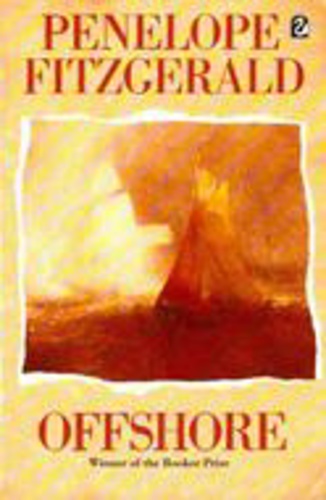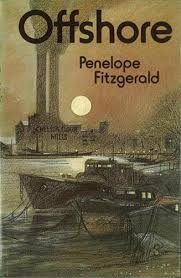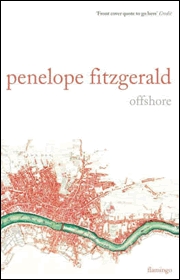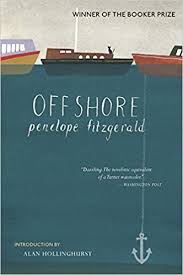Not Very Far Offshore
 Tuesday, September 11, 2018 at 8:03PM
Tuesday, September 11, 2018 at 8:03PM From the very first page Penelope Fitzgerald’s novel Offshore feels damp, musty, almost muddy, like the Thames riverside where it is set. Then this story of boats and people gets wet, sunken, drowned.
You say you thought I was writing this summer about ocean novels, fiction in which the ocean, not a river, is a main character? Well, the Thames is a tidal river, inexorably linked to the North Sea, up from which twice a day the tides surge into and past London, soaking all in their path. The tides relentlessly lift and drop every boat on the river, including the rough old houseboat barges where the novel’s characters live, as much as 24 feet, as the rushing waters scours the banks and sometimes human lives.
Reading the novel made me a little queasy, sea/river sick, with all the motion. And I wished for a dehumidifier. But the sweet and sad and very appealing characters who live on the houseboats in 1961 seem unfazed by the challenges of leaks and pumps and gangplanks and primitive plumbing. Almost like a crew of a ship there is a male leader of the ramshackle community, Richard, with a pretty water-worthy boat, Lord Jim. Then there are several less responsible survivors, among them a male prostitute, an elderly maritime painter, and a struggling young mother and her two daughters, on their minimal boat, Grace.
Of my summer series of wet novels, Offshore reminded me most of Frederick Buechner’s Storm. In both novels the tension builds for our motley crew as wind and water conspire to change everything. And like Storm, Offshore could have ended with a lot more marine carnage, but actually concludes with some hope. It is as if the tidal storm washes at least some of the characters clean, but at the cost of a lost community.
It is a sad tale. Fitzgerald has written that she often writes about “people who seem to have been born defeated or even profoundly lost… They are ready to assume the conditions the world imposes on them, but they don’t manage to submit to them, despite their courage and their best efforts… When I write it is to give these people a voice.” [These barge dwellers are] “creatures neither of firm land nor water. They may aspire to the sensible and adequate conditions of life on the Chelsea shore, but a certain failure, distressing to themselves, to be like other people, causes them to sink back, with so much else that drifted or was washed up, into the mud moorings of the great tideway.”
They are indeed “creatures neither of firm land nor water,” and they seem content in this liminal state. But other forces, like the tides, relentless pull them on shore or out to sea. Fitzgerald writes short novels but they are rich in language and nuance. In this case she describes both scene and people with lots of mud, currents, eddies, drifting. The barges, like the people, longing to ride free in the midstream as they once did, but they are anchored to the mud, until they are not.
Fitzgerald herself lived on a barge for two years in the 50’s as her husband succumbed to alcoholism and she struggled to raise her children and write. Like Willis in this book, her barge sank and she lost books and papers. But like these survivors, she rose and wrote.
Look at these four of many different covers for the book. It’s almost as if the novel is a puddle that reflects so many very different images for publishers and readers.
- There is a theme of maritime art, and a sweet visit by the painter and the young girls to the Tate to see Turner and Whistler marine paintings.

- Their barges are tethered near the Battersea Power Station – more liminal contrasts of a simple life of wet wood and often no power and the imposing steel energy station.

- The river winds through London and we spend 141 pages in only a tiny little section of it on this map.

- And the anchors hang down, but not quite far enough.

I loved this novel, and others by Fitzgerald are just a poignant. Reading it 40 years after it was published (and subsequently won the Booker Prize) we know that now this small liminal community has long disappeared and been replaced by gleaming glass condos and reinforced concrete Embankments.
But like the girls going out at low tide to scour for hidden treasures they could sell, an ancient practice called mudlarking, we probably could stand on any tidal shore and look just “offshore” and see the treasured remnants of lives such as these.
Copyright © 2018 Deborah Streeter
Reader Comments